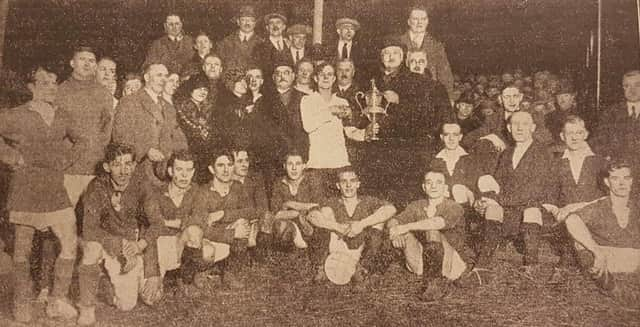How an Ollerton team played their part in football history


However, there was a time, not that long ago, when floodlit football in England was as a rarity.
The first ever floodlit game in England took place at Sheffield United’s Bramall Lane ground in 1878 yet it took 52 years before the first competitive game in England was played under floodlights.
Advertisement
Hide AdAdvertisement
Hide AdIt took place on Saturday 22nd February 1930 at Mansfield Town’s Field Mill Stadium. Though they only plyed their trade in the Midland League, Mansfield were an ambitious club and decide to experiment using the latest in lightning technology to stage the game.
Four, forty-feet high towers were placed at each corner of the pitch so that all parts of the ground were illuminated up to a height of 70 feet. The cost of the equipment cost £1200 and the electricity for the match came to a total of £3.
The decision to stage the game caught the attention of a national audience. Officials from Wembley were present whilst representatives of Sheffield Wednesday, Arsenal, Notts County and several others all turned up to see the latest development in English Floodlit football.
Given all this, it was a surprise that the game chosen was a fairly small affair, a North Notts Senior Cup final between Ollerton Forest and Welbeck Athletic.
Advertisement
Hide AdAdvertisement
Hide AdA huge crowd of over 6000 people turned up, with Welbeck playing in red shirt and white shorts, whilst Ollerton played in white shirt and black shorts to make sure the crowd could see clearly.
According to reports, visibility was very good and from the middle of the main stand, spectators could clearly see both goals and identify which team was which due to the colour of their kits.
The match itself was an even affair in the opening period with the neither side managing to find a goal before half time.It was to be Lowds who scored the game’s opening goal to set Ollerton on course for victory. He latched onto a defensive error before lobbing Chambers in the Welbeck goal. White scored Ollerton’s second to put them in a commanding position before Chadburn made it 3-0 from the penalty spot to complete an emphatic victory.Mr Arthur Hines, of the FA, presented the trophy to Ollerton and he congratulated them on their success in what was also their debut season as a club.The experiment was a unanimous success with the referee and both captains going on record to discuss the quality of the lighting. In fact, the game went so well that a representative of Wembley Stadium commented that it would not be a surprise for Wembley to install similar lights.
Therefore it may be a surprise to find out that a few months later, the FA banned member clubs playing games by artificial light, a ban that remained in place until December 1950.
What connection Ollerton Forest has to the Ollerton Colliery side who would win the Notts Senior Cup in 1937/38 remains unclear, as is where Ollerton Forest played their home games.